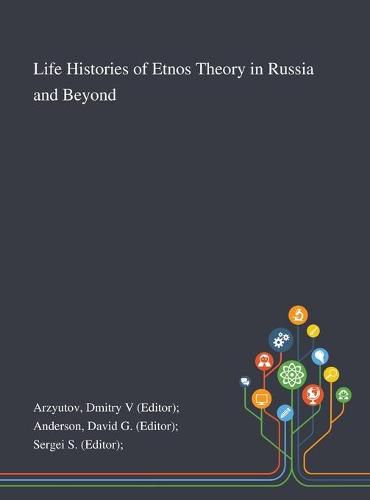Readings Newsletter
Become a Readings Member to make your shopping experience even easier.
Sign in or sign up for free!
You’re not far away from qualifying for FREE standard shipping within Australia
You’ve qualified for FREE standard shipping within Australia
The cart is loading…






This title is printed to order. This book may have been self-published. If so, we cannot guarantee the quality of the content. In the main most books will have gone through the editing process however some may not. We therefore suggest that you be aware of this before ordering this book. If in doubt check either the author or publisher’s details as we are unable to accept any returns unless they are faulty. Please contact us if you have any questions.
The idea of etnos came into being over a hundred years ago as a way of understanding the collective identities of people with a common language and shared traditions. In the twentieth century, the concept came to be associated with Soviet state-building, and it fell sharply out of favour. Yet outside the academy, etnos-style arguments not only persist, but are a vibrant part of regional anthropological traditions. Life Histories of Etnos Theory in Russia and Beyond makes a powerful argument for reconsidering the importance of etnos in our understanding of ethnicity and national identity across Eurasia. The collection brings to life a rich archive of previously unpublished letters, fieldnotes, and photographic collections of the theory’s early proponents. Using contemporary fieldwork and case studies, the volume shows how the ideas of these ethnographers continue to impact and shape identities in various regional theatres from Ukraine to the Russian North to the Manchurian steppes of what is now China. Through writing a life history of these collectivist concepts, the contributors to this volume unveil a world where the assumptions of liberal individualism do not hold. In doing so, they demonstrate how notions of belonging are not fleeting but persistent, multi-generational, and bio-social. This work was published by Saint Philip Street Press pursuant to a Creative Commons license permitting commercial use. All rights not granted by the work’s license are retained by the author or authors.
$9.00 standard shipping within Australia
FREE standard shipping within Australia for orders over $100.00
Express & International shipping calculated at checkout
This title is printed to order. This book may have been self-published. If so, we cannot guarantee the quality of the content. In the main most books will have gone through the editing process however some may not. We therefore suggest that you be aware of this before ordering this book. If in doubt check either the author or publisher’s details as we are unable to accept any returns unless they are faulty. Please contact us if you have any questions.
The idea of etnos came into being over a hundred years ago as a way of understanding the collective identities of people with a common language and shared traditions. In the twentieth century, the concept came to be associated with Soviet state-building, and it fell sharply out of favour. Yet outside the academy, etnos-style arguments not only persist, but are a vibrant part of regional anthropological traditions. Life Histories of Etnos Theory in Russia and Beyond makes a powerful argument for reconsidering the importance of etnos in our understanding of ethnicity and national identity across Eurasia. The collection brings to life a rich archive of previously unpublished letters, fieldnotes, and photographic collections of the theory’s early proponents. Using contemporary fieldwork and case studies, the volume shows how the ideas of these ethnographers continue to impact and shape identities in various regional theatres from Ukraine to the Russian North to the Manchurian steppes of what is now China. Through writing a life history of these collectivist concepts, the contributors to this volume unveil a world where the assumptions of liberal individualism do not hold. In doing so, they demonstrate how notions of belonging are not fleeting but persistent, multi-generational, and bio-social. This work was published by Saint Philip Street Press pursuant to a Creative Commons license permitting commercial use. All rights not granted by the work’s license are retained by the author or authors.